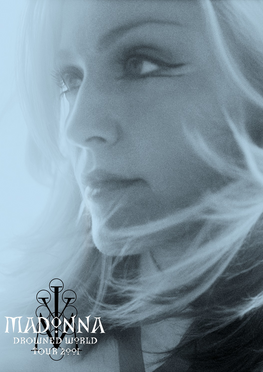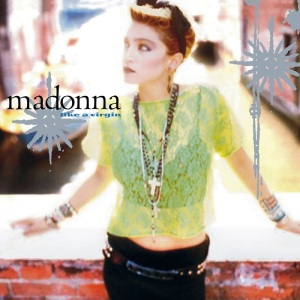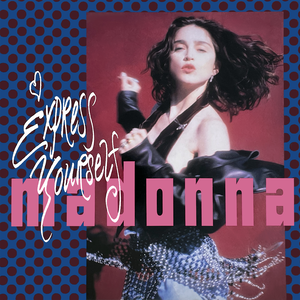Other uses
- A female person (girl or woman) who is materialistic
- A sobriquet for the American singer Madonna, or her Material Girl Collection clothing line designed with her daughter Lourdes Ciccone Leon
Material girl or material girls may refer to:

Madonna Louise Ciccone is an American singer, songwriter, and actress. Dubbed the "Queen of Pop", Madonna has been widely recognized for her continual reinvention and versatility in music production, songwriting, and visual presentation. She has pushed the boundaries of artistic expression in mainstream music, while continuing to maintain control over every aspect of her career. Her works, which incorporate social, political, sexual, and religious themes, have generated both controversy and critical acclaim. A prominent cultural figure of the 20th and 21st centuries, Madonna remains one of the most "well-documented figures of the modern age", with a broad amount of scholarly reviews and literature works on her, as well as an academic mini subdiscipline devoted to her named Madonna studies.

Like a Virgin is the second studio album by American singer and songwriter Madonna, released on November 12, 1984, by Sire Records. Following the success of her self-titled debut album, Madonna wanted to become the record producer of her next album. However, her label was not ready to give her the artistic freedom and she chose Nile Rodgers instead to produce the album due to his work with David Bowie. Madonna wrote six songs on the record, five of which feature Steve Bray as a co-writer. The album was recorded at Power Station Studio in New York at a quick pace. Rodgers enlisted the help of his former Chic bandmates Bernard Edwards, who was the bassist, and Tony Thompson, who played drums. Jason Corsaro, the record's audio engineer, persuaded Rodgers to use digital recording, a new technique introduced at that time.

"Who's That Girl" is a song by American singer Madonna from the soundtrack of the 1987 film Who's That Girl. Written and produced by Madonna and Patrick Leonard, it was released in Europe as the soundtrack's lead single on June 29, 1987; in the United States, a release was issued the following day. In 2009, it was included on Madonna's third greatest hits compilation, Celebration. An uptempo pop song, "Who's That Girl" continued the singer's fascination with Latin pop, a genre she had previously explored on her single "La Isla Bonita". It features instrumentation from drums, bass, and trumpets, and has lyrics sung both in English and Spanish. While shooting for the film, then called Slammer, Madonna had requested Leonard to develop a song that captured the nature of her film character; the producer worked on a demo and, afterwards, Madonna added the lyrics and decided to rename the song, as well as the film, to "Who's That Girl".

"Material Girl" is a song recorded by American singer Madonna for her second studio album, Like a Virgin (1984). It was released on January 23, 1985, by the Sire label as the second single from Like a Virgin. It also appears slightly remixed on the 1990 greatest hits compilation, The Immaculate Collection, and in its original form on the 2009 greatest hits compilation, Celebration. The song was written by Peter Brown and Robert Rans, while Nile Rodgers produced the track. Madonna explained that the concept of the song was indicative of her life at that time, and she liked it because she felt it was provocative.
John Benitez (born November 7, 1957), also known as Jellybean, is an American musician, songwriter, DJ, remixer, and music producer. He has produced and remixed artists such as Madonna, Whitney Houston, Michael Jackson, and the Pointer Sisters. He was later the executive producer of Studio 54 Radio. In December 2016, Billboard magazine ranked him as the 99th most successful dance artist of all-time.

The Drowned World Tour was the fifth concert tour by American singer-songwriter Madonna in support of her seventh and eighth studio albums Ray of Light (1998) and Music (2000), respectively. The tour began on June 9, 2001, in Barcelona, Spain and ended in Los Angeles, California on September 15. It was her first tour in eight years, following The Girlie Show in 1993. Set to start in 1999, it was delayed until 2001 as Madonna filmed and starred in the movie The Next Best Thing (2000), began working on Music, gave birth to her son Rocco and married Guy Ritchie.

"What It Feels Like for a Girl" is a song recorded by American singer Madonna for her eighth studio album Music (2000). It was released as the third and final single from the album on April 16, 2001, by Maverick Records. Madonna and Guy Sigsworth wrote and produced the song with David Torn as co-writer, and Mark "Spike" Stent as a co-producer. "What It Feels Like For a Girl" is a mid-tempo electronic and synth-pop song. Lyrically, it conveys society's double standard toward women, addressing hurtful myths about female inferiority. To emphasize the message, the song opens with a spoken word sample by actress Charlotte Gainsbourg from the 1993 British film The Cement Garden. A Spanish version of the track, "Lo Que Siente la Mujer", was translated by Alberto Ferreras and included in the Latin American edition of Music.

"Like a Virgin" is a song recorded by American singer Madonna from her second album Like a Virgin (1984). The song was written and composed by Tom Kelly and Billy Steinberg, and it was released as the album's lead single on October 31, 1984. A dance song with two hooks, Madonna sings in a high register while a continuous arrangement of synths are heard along the bassline. The song's lyrics are ambiguous, consisting of hidden innuendos and open to various interpretations.

"Holiday" is a song by American singer Madonna from her eponymous debut album, Madonna (1983). Sire Records released it as the album's third single on September 7, 1983. Written by Curtis Hudson and Lisa Stevens of Pure Energy, the track was offered to Madonna by her producer John "Jellybean" Benitez when she was looking for a potential hit track to include on her debut album. After accepting the song, she and Benitez worked on it and altered its composition by the addition of a piano solo performed by their friend, Fred Zarr. "Holiday" features instrumentation from guitars, electronic handclaps, a cowbell, and a synthesized string arrangement, while its lyrics speak about the universal sentiment of taking a holiday.

"Crazy for You" is a song recorded by American singer Madonna for the film Vision Quest (1985). It was released on March 2, 1985 by Geffen Records as the lead single from the film's soundtrack album. Film producers Jon Peters and Peter Guber, along with music director Phil Ramone, decided to use Madonna after listening to her previous recordings, employing John Bettis and Jon Lind to write the song. After reading the script of the film, Bettis and Lind wrote the song about the situation in which the lead characters meet at a nightclub. Initial recording sessions did not impress Bettis and Lind, and they felt that "Crazy for You" would be dropped from the soundtrack. However, a new version was recorded to their liking.

"Fever" is a song written by Eddie Cooley and Otis Blackwell, who used the pseudonym John Davenport. It was originally recorded by American R&B singer Little Willie John for his debut album, Fever (1956), and released as a single in April of the same year. The song topped the Billboard R&B Best Sellers in the US and peaked at number 24 on the Billboard pop chart. It was received positively by music critics and included on several lists of the best songs during the time it was released.
A bedtime story is a popular form of storytelling.

The Re-Invention World Tour was the sixth concert tour by American singer-songwriter Madonna, in support of her ninth studio album American Life (2003). The tour began on May 24, 2004, in Inglewood and ended on September 14 in Lisbon. Additionally, it marked Madonna's first concerts in Portugal and Ireland. Rumors of a concert tour first began circulating on October 2003, but nothing was confirmed until March 2004. According to some, the title Re-Invention was a dig at Madonna's critics who, throughout her career, had talked about her "reinventing herself"; the singer said she chose this name because she wanted to "re-invent" her old material. A number of songs were rehearsed for the tour, with twenty-four making the final setlist. Like past Madonna tours, Re-Invention was divided into different thematic acts: Marie Antoinette, Military, Circus, Acoustic, and Scottish-Tribal; the wardrobe was created by designers Arianne Phillips, Stella McCartney, Christian Lacroix, and Karl Lagerfeld.

"Express Yourself" is a song by American singer-songwriter Madonna from her fourth studio album, Like a Prayer (1989). It was released as the second single from the album on May 9, 1989, by Sire Records. The song was included on the greatest hits compilation albums The Immaculate Collection (1990), and Celebration (2009). "Express Yourself" was the first song that Madonna and co-producer Stephen Bray collaborated on for Like a Prayer. Written and produced by them, the song was a tribute to American funk and soul band Sly and the Family Stone. The main inspiration behind the song is female empowerment, urging women never to go for second-best and to urge their partners to express their inner feelings.

"Hanky Panky" is a song by American singer Madonna from her soundtrack album I'm Breathless. It was released on June 12, 1990, by Sire Records as the album's second and final single. Written and produced by Madonna and Patrick Leonard, the song was developed from a line in the parent film, Dick Tracy, talking about a woman who enjoys being spanked by her partner. Performed in an almost comical style, "Hanky Panky" is a jazz and swing song with a changing bassline and minor to major key-shift in the chorus. It caused some controversy in Ireland because of its innuendo and racy lyrics, with women's groups deeming them as harmful; Madonna later clarified that the lyrics were intended as a joke.

The Who's That Girl World Tour was the second concert tour by American singer and songwriter Madonna. The tour supported her 1986 third studio album True Blue, as well as the 1987 soundtrack Who's That Girl. It was Madonna's first world tour and marked her first visits to Japan and Europe. Musically and technically superior to her previous Virgin Tour, Who's That Girl incorporated multimedia components to make the show more appealing.
"Diamonds Are a Girl's Best Friend" is a jazz song introduced by Carol Channing in the original Broadway production of Gentlemen Prefer Blondes (1949), with music by Jule Styne and lyrics by Leo Robin.

Ciao Italia: Live from Italy is a video album by American singer-songwriter Madonna and was released by Warner Reprise Video and Sire Records on May 24, 1988. It contained footage from a previous TV special of the Who's That Girl World Tour, Madonna in Concerto, broadcast in Europe in 1987, filmed at the Stadio Comunale in Turin, Italy. The video release also contained footage from shows recorded in Florence, Italy and Tokyo, Japan, the latter having previously been released as a Japanese TV special and home video release, Who's That Girl: Live in Japan. The decision to release Ciao Italia was spurred by the fact that this previous release became a commercial success in Japan. A re-release of the video took place in 1999, when it was released in DVD format, with a stereo soundtrack containing the songs only.
"The Power of Madonna" is the fifteenth episode of the American television series Glee. The episode premiered on the Fox network on April 20, 2010. When cheerleading coach Sue Sylvester demands that Madonna's music be played over the school intercom system, glee club director Will Schuester sets the club a Madonna-themed assignment, hoping to empower the female club members. "The Power of Madonna" was written and directed by series creator Ryan Murphy, and serves as a musical tribute to Madonna, featuring cover versions of eight of her songs, with the singer having granted Glee the rights to her entire catalogue of music. Glee: The Music, The Power of Madonna, an album containing studio recordings of songs performed in the episode, was released on April 20, 2010.